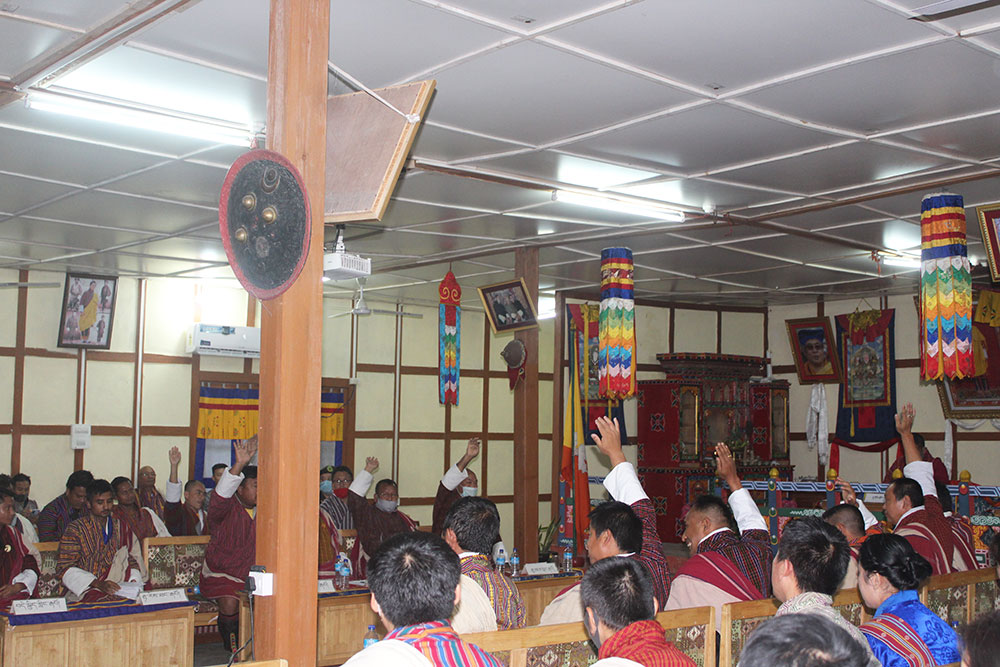They are worried of losing gewog engineers to dzongkhag
Nima | Sarpang
Gups in Sarpang voiced their concerns against restructuring in the dzongkhag engineering sector, where all engineers in the dzongkhag would be pooled together.
The re-organisation plan is expected to enable knowledge sharing, specialisation of engineers and lead to improved work quality as engineers with different expertise and qualification would be stationed together.
Through the reorganisation plan, dzongkhag engineering sector would be reorganised as dzongkhag engineering and human settlement sector with five different sections of human settlement, infrastructure design, municipal service, implementation and monitoring, and compliance section.
Under the infrastructure design section, there would be three units of building, roads and bridge, and water and sanitation.
During the last dzongkhag tshogdu conducted on August 19, most gups said it is important to have engineers in the gewogs.
The DT resolved that gewogs could keep the engineers for a time being, but should abide by the government’s directives and sent the engineers to the dzongkhag.
The DT chairperson, Nim Dorji Sherpa, said local government officials have to support the plans and policies of the government.
He said that although gewogs were supposed to have an accountant, engineer and administrative officer, only some gewogs have the officials today.
“There is a need for an engineer in the gewog, but it is not appropriate to push the government in these difficult times,” he said. “The Department of local government has started to study the challenges faced by gewog administrations.”
Gelephu gup Ugyen Wangchuk said that an engineer plays an important role in the gewog administration.
“We face lots of problems when they are away even for a month. We won’t be able to achieve the set target and the budgets won’t be utilised well if they are stationed in the dzongkhag,” he said.
The dzongkhag could spend only over 70 percent of the total budget in the fiscal year 2020-21 while gewogs utilised almost 100 percent budget, according to the officials from the dzongkhag.
Ugyen Wangchuk said engineers in gewogs are busy compared to the engineers in the dzongkhag, who only look after big projects. “Big projects come once in four or five years whereas in gewogs, many small construction and plans are implemented frequently.”
He said gewogs would not be able to use expertise of engineers if they are stationed in dzongkhag. “Restructuring of engineers in the dzongkhag was a good initiative but it might not cater to the immediate need of the gewogs.”
According to the gup, the government might have to bear extra expenses on travel and daily allowances of engineers once they are pooled in the dzongkhag. “Country is not in a good situation today. The pandemic is far from over. There might be lockdown any time and it’s important that we have them in gewogs.”
Umling gup, Ugyen Norbu, said restructuring the engineering sector was aimed to provide improved services with the limited resource at hand.
He said change should not impact the people. “We were most benefited with the engineers in the gewog.”
Gups said they have to seek approval from the dzongkhag even for a survey in the past when engineers were not placed in gewogs, delaying the service and progress at the grassroots.
Dzongkhag’s chief engineer, Sangay Tenzin, said that there were only limited expertise and professionals in the dzongkhag today. “Engineers are stationed in gewogs, drungkhag and dzongkhag. When gewogs approach the dzongkhag for help, it is not available readily. We have engineers with expertise in water projects and irrigation in the drungkhag.”
He said it is difficult to monitor engineers when they are not stationed together.
There are 14 civil engineers in Sarpang today, six in dzongkhag, three in gewogs, and five in Umling drungkhag. There is one technician each in 11 gewogs and one each in drungkhag and dzongkhag.
The chief engineer said that using the current set of engineers well would be much better with the restructuring of the sector. “Design, estimate, monitoring, and implementation from the beginning of work to end, is done by one engineer today. The quality gets compromised.”
Sarpang dzongdag, Lobzang Dorji, said that the restructuring of the sector was not about taking away engineers from gewogs. “The resource and expertise remain in the dzongkhag whether they are working from gewog or dzongkhag.”
He explained the restructuring plan is as per the Royal Civil Service Commission’s aim to maintain small, compact, and efficient civil service. “It would enable effective use of limited resources in the dzongkhag.”
He also said this is expected to be more convenient, transparent, and there would be more accountability with different people involved in design, estimate, implementation, and monitoring.
Edited by Tashi Dema


